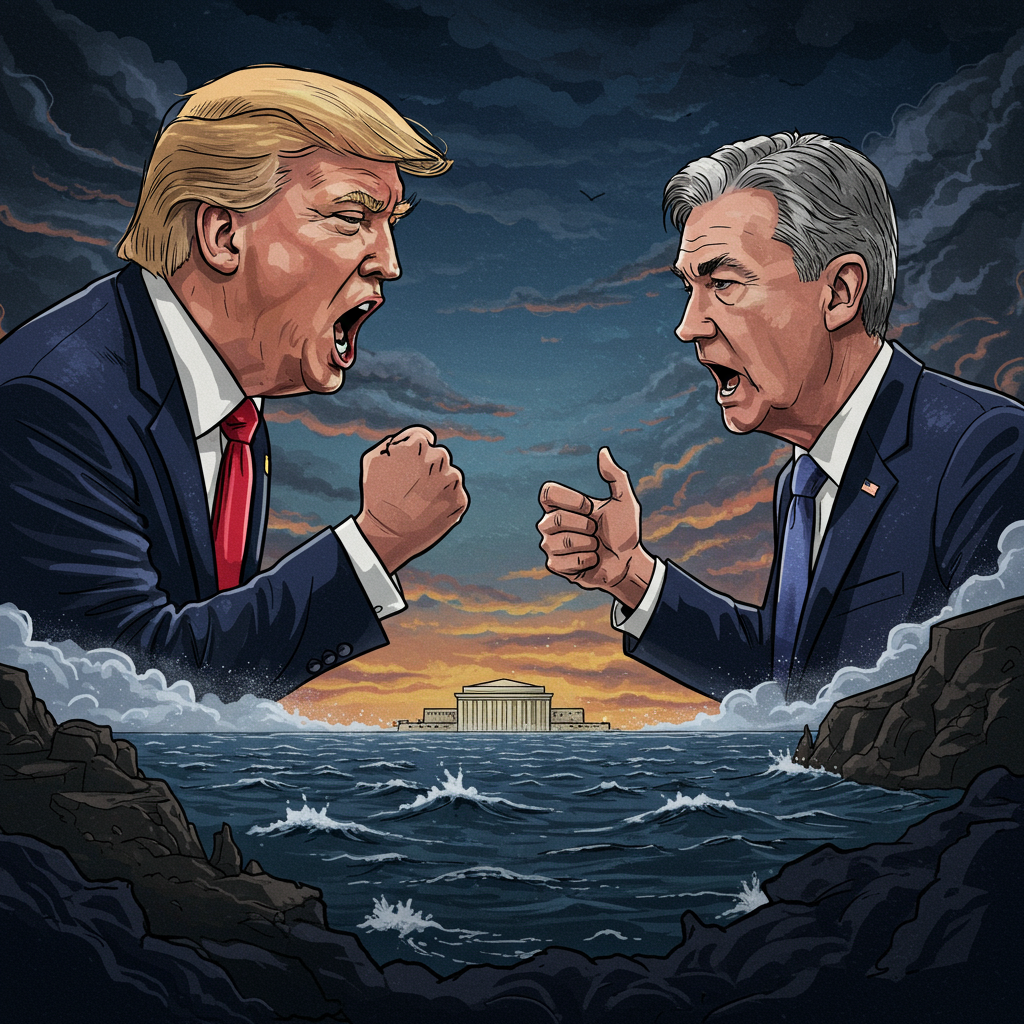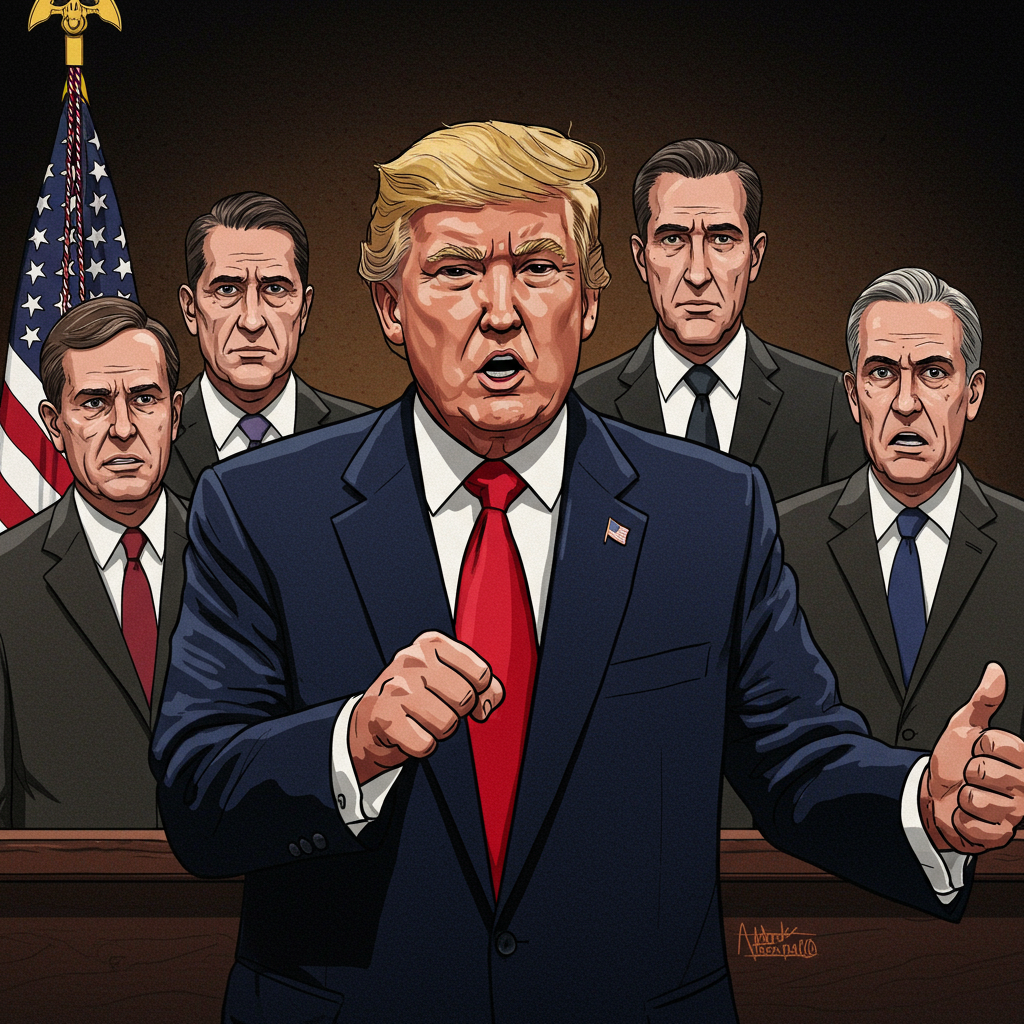Former President Donald Trump has dramatically escalated his pressure on federal Reserve Chair Jerome powell, publicly demanding his immediate resignation on July 3, 2025. This pointed call came shortly after Federal Housing Finance Agency (FHFA) Director Bill pulte publicly urged Congress to investigate Powell, citing allegations of deceptive testimony regarding costly renovations at the Fed headquarters. The move intensifies a long-running political feud primarily centered on the U.S. central bank’s handling of interest rates and monetary policy.
Trump’s demand represents a significant shift from previous, less direct criticisms. While he has long voiced frustration with Powell, this explicit call for immediate resignation, amplified via his Truth Social platform, marks a new level of confrontation. The pressure on Powell appears to be mounting from two distinct, yet now connected, fronts: Trump’s consistent disagreement with interest rate levels and the recent, specific accusations raised by FHFA Director Pulte.
Persistent Clash Over Interest Rates
Trump’s most enduring grievance against Chairman Powell centers on the Federal Reserve’s benchmark interest rate. For months, Trump has argued these rates are “artificially high,” hindering economic growth and imposing a massive financial burden on the nation. He frequently claims this policy has cost the U.S. “a fortune.”
The former president estimates the financial loss at “hundreds of billions of dollars.” He contends that existing economic conditions, specifically his view that there is “no inflation,” do not justify the current rate levels, which stand within a range of 4.25 to 4.5 percent as of early July 2025. White House press secretary Karoline Leavitt confirmed that Trump recently sent a direct note to Powell reiterating his stance. Leavitt quoted Trump telling Powell, “‘Jerome, you are, as usual, too late. You have cost the USA a fortune and continue to do so.'” The note also urged Powell to significantly lower rates, highlighting that other major economies maintain lower borrowing costs compared to the United States.
Powell has previously defended the Fed’s cautious approach to rate cuts. During a panel discussion in Portugal earlier, Powell indicated the central bank adopted a “wait-and-see approach” on rate reductions partly to assess the economic impact of tariffs, including those proposed by the Trump administration. Powell suggested that without the uncertainty created by tariff policies, the Fed might have pursued rate cuts more aggressively.
Allegations of Deceptive Testimony and Renovation Controversy
Adding a new layer to the conflict, FHFA Director Bill Pulte publicly called for a congressional investigation into Chairman Powell. On July 3, 2025, Pulte posted a statement on X, urging Congress to probe Powell’s “political bias” and what Pulte termed his “deceptive Senate testimony.” Pulte asserted these issues provided sufficient grounds for Powell’s removal “for cause,” a specific legal term for dismissing heads of independent agencies for misconduct.
Pulte’s accusations stem from Powell’s testimony before the Senate Banking Committee the previous week. Pulte alleged Powell made “factually inaccurate statements” while addressing questions about expensive renovations underway at the Federal Reserve’s Washington, D.C. headquarters. Referencing comments from Senator Cynthia Lummis, Pulte claimed Powell was inaccurate when discussing specific features associated with the project, such as a “plush private dining room and elevator, skylights, water features and roof terrace.” Pulte labeled the overall situation a “$2.5B Building Renovation Scandal.” He described Powell’s alleged inaccurate testimony as “malfeasance” demanding immediate congressional investigation into both the renovation controversy and Powell’s alleged “political bias.” In his own testimony, Powell had dismissed media reports about the renovation costs and features, stating they were “misleading and inaccurate in many, many respects.”
Congressional Response and Legal Hurdles
Responding to Pulte’s call for a probe, House Judiciary Chair Jim Jordan indicated the committee was open to reviewing the matter. Speaking on July 3, 2025, Jordan stated that while they hadn’t specifically discussed investigating Powell, “everything is on the table.” He emphasized that oversight of the executive branch falls under the committee’s constitutional duties and confirmed they would “take a look” at the allegations. A representative for the Federal Reserve declined to comment on the unfolding situation.
Legally, removing a Federal Reserve Chair before their term expires presents significant challenges. U.S. federal law restricts the president’s power to remove the chair only “for cause.” This legal standard is generally interpreted as applying to specific misconduct or dereliction of duty, rather than simple disagreements over monetary policy decisions. A May Supreme Court ruling further reinforced the Federal Reserve’s unique status among independent federal agencies, solidifying the constraints on presidential power to remove the top central banker. Jerome Powell, who was renominated by President Joe Biden and whose current term concludes in May 2026, has previously stated he would not resign if asked by a president, citing these legal protections. Despite these legal complexities, reports suggest Trump is already exploring potential successors for Powell.
Broader Implications for Fed Independence
The escalating political attacks targeting the Federal Reserve Chair raise significant questions about the independence of the U.S. central bank. Presidents typically respect the Fed’s autonomy in setting monetary policy, recognizing its critical role in maintaining economic stability free from direct political pressure. Trump’s repeated public demands for specific interest rate actions and now an explicit call for Powell’s resignation challenge this established norm.
The focus on alleged “political bias” and internal renovation details by officials like Pulte further politicizes the Fed’s operations. This dynamic creates uncertainty regarding the future direction of U.S. monetary policy and potentially sets a precedent for increased political interference in the central bank’s decision-making processes. Such interference could impact market confidence and long-term economic planning, potentially undermining the stability the Fed is designed to provide.
Frequently Asked Questions
What specific reasons did Donald Trump give for calling for Jerome Powell’s resignation?
Donald Trump cited two primary reasons for his demand for Federal Reserve Chair Jerome Powell’s immediate resignation. His long-standing grievance is that Powell has kept U.S. interest rates too high for too long, claiming this policy has cost the country “hundreds of billions of dollars” and that Powell is “too late” in lowering them. More recently, Trump amplified allegations made by FHFA Director Bill Pulte, who accused Powell of giving “deceptive” testimony to Congress regarding expensive renovations at the Fed’s headquarters, suggesting this constitutes misconduct warranting removal.
What allegations did FHFA Director Bill Pulte make against Chairman Powell?
FHFA Director Bill Pulte called for a congressional investigation into Federal Reserve Chairman Jerome Powell based on several allegations. Pulte accused Powell of “political bias” and providing “deceptive Senate testimony.” These accusations specifically relate to Powell’s recent testimony where he discussed renovations at the Fed headquarters. Pulte claimed Powell made “factually inaccurate statements” about features like dining rooms and roof terraces associated with a “$2.5B Building Renovation Scandal,” labeling Powell’s alleged actions as “malfeasance” sufficient for removal “for cause.”
What are the legal requirements for removing a Federal Reserve Chair?
Under U.S. federal law, the President’s power to remove a Federal Reserve Chair before their term expires is limited. The chair can only be removed “for cause,” a legal standard typically interpreted as applying to serious misconduct or dereliction of duty, not merely policy disagreements. This limitation on presidential authority was affirmed by a Supreme Court ruling in May 2025, recognizing the Fed’s distinct status as an independent agency. The current chair, Jerome Powell, has stated he would not resign if asked, citing these legal protections.
Conclusion
Donald Trump’s demand for Federal Reserve Chair Jerome Powell’s immediate resignation marks a significant intensification of their political conflict. Fueled by persistent criticism over U.S. interest rates and new allegations regarding the Fed headquarters renovation controversy and Powell’s testimony, the call puts renewed focus on the political pressures facing the central bank. The situation highlights the ongoing tension between political objectives and the Federal Reserve’s independent mandate, while also underscoring the legal limitations on presidential power to remove the Fed’s leadership. This development signals continued uncertainty regarding the relationship between the White House and the nation’s central bank.




